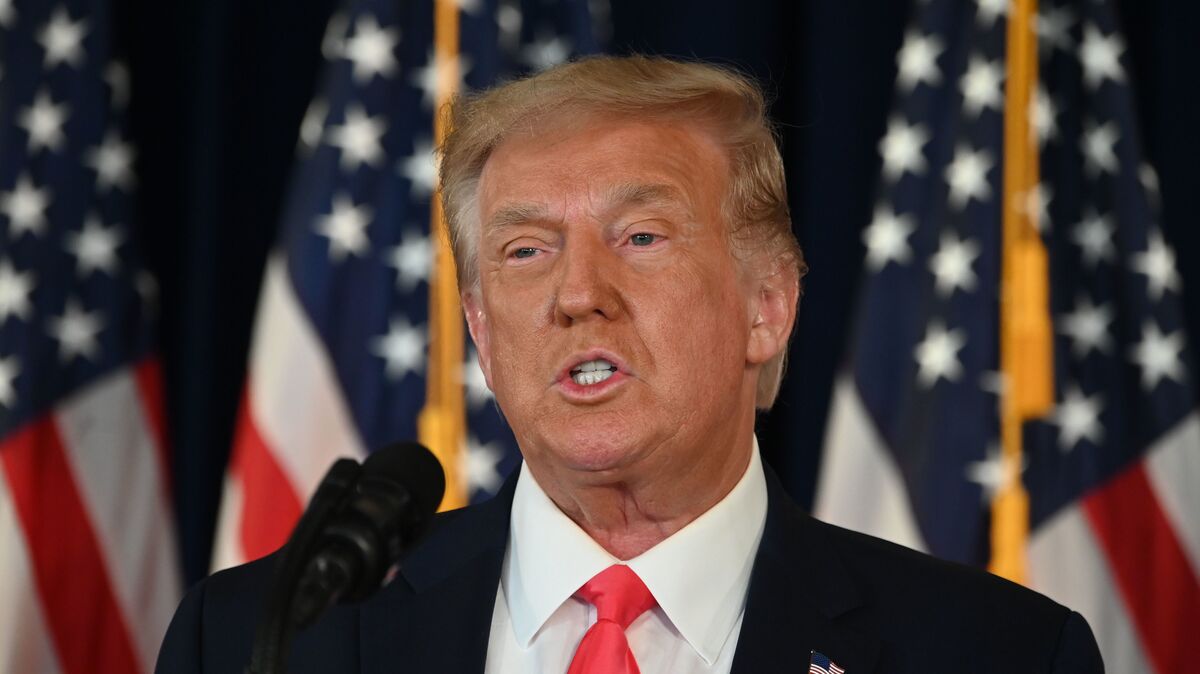
[ad_1]

President Trump speaks during a news conference in Bedminster, N.J., on Saturday.
Jim Watson/AFP via Getty Images
hide caption
toggle caption
Jim Watson/AFP via Getty Images

President Trump speaks during a news conference in Bedminster, N.J., on Saturday.
Jim Watson/AFP via Getty Images
At his Bedminster golf resort on Saturday, President Trump signed four executive actions to provide economic relief amid the coronavirus pandemic. It amounts to a stopgap measure, after failing to secure an agreement with Congress.
Although the White House has not yet released the text of the actions, Trump said they would extend enhanced unemployment benefits that expired more than a week ago, extend a moratorium on evictions and continue the suspension of student loan repayments.
The previous enhanced unemployment benefits added $600 a week to standard state unemployment benefits. But Trump’s executive action would cut it to $400 and would require states to fund 25% of it.
“If they don’t, they don’t. That’s up to them,” Trump said when asked what happens if governors don’t have the funds available. “The states have the money. It’s sitting there.”
A fourth action would defer payroll tax collection for workers earning less than $100,000 a year. Trump suggested it would be retroactive to Aug. 1, though the night before he had said the start date would be July 1. Trump said the “payroll tax holiday” would last through the end of the year but could be made permanent if he is reelected. The connection to November’s election wasn’t subtle.
“If I’m victorious on Nov. 3, I plan to forgive these taxes and make permanent cuts to the payroll tax. I’m going to make them all permanent,” Trump said, then turning to jab congressional Democrats and his opponent, former Vice President Joe Biden. “So they will have the option of raising everybody’s taxes and taking this away. But if I win, I may extend and terminate. In other words I will extend it beyond the end of the year and terminate the tax. And so, we’ll see what happens.”
Both congressional Democrats and Republicans alike opposed this payroll tax proposal when President Trump was trying to get them to include it in the coronavirus relief package. Payroll taxes fund Medicare and Social Security and this deferral won’t do anything to help the millions of Americans currently unemployed.
Trump is likely doing this through the same mechanism that allowed taxpayers to put off filing their taxes until July 15 this year, says Andrew Rudalevige, a professor at Bowdoin College who specializes in presidential executive actions.
“The Treasury Secretary is authorized to delay the deadline for any action required under tax law up to one year,” said Rudalevige, in case of a federally declared disaster, and all states are currently operating under one due to the pandemic. “So payroll tax payments could under this provision be delayed. But, not forgiven — those taxes are still owed.”
There are already significant concerns about the long-term solvency of the popular social safety net programs. Reducing payroll taxes would hasten those problems.
On evictions, the federal moratorium expired on July 24, allowing landlords to begin issuing 30-day notices to vacate their properties. It is estimated the temporary ban on evictions covered more than 12 million renters, preventing them from being pushed out of their homes even if they couldn’t pay rent.
The temporary forbearance on student loan repayments is set to expire Sept. 30.
[ad_2]
Source link